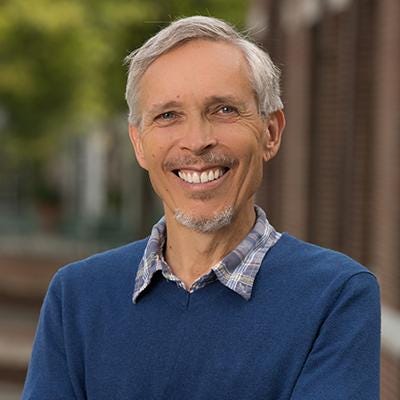"The Truth is Out There"
Featuring our natural science channels and an interview with Professor Chris Impey
Natural Science
In physicist Richard Feynman’s famous Feynman Lectures, he asserts that “If, in some cataclysm, all of scientific knowledge were to be destroyed, and only one sentence passed on to the next generation of creatures,” he would want that sentence to be: “all things are made of atoms—little particles that move around in perpetual motion, attracting each other when they are at a little distance apart, but repelling upon being squeezed into one another.” Feynman’s sentence about atoms is even more brilliant when considering that it’s also an apt description of the patterns of larger objects, like planets.
A constant interplay of scale, from the very big to the very small, lies at the heart of science. Virologists and epidemiologists study microscopic viruses spread across an entire planet, astrobiologists look for evidence of (tiny) life across light-years of distance, and physicists examine particles to understand the cosmology of the universe. Because scientists must constantly negotiate scale, learning about the world requires great creativity. Without tools, we cannot see the very small or the very big (yet far away). Feynman’s lectures are a treasure trove of great diagrams, witty sentences, and thoughtful analysis that make the complex clear.
This week, we feature our natural science podcasts, with the explicit goal of making difficult science accessible to all:
Scholarly Sources
Chris Impey is University Distinguished Professor of Astronomy at the University of Arizona.
Q: What are you reading right now?
A: I’m re-reading Time’s Arrow by Martin Amis. He died recently and was always one of my favorite writers, clever and witty and a great chronicler of London life. Time’s Arrow is a tour de force, about a former concentration camp guard, written in reverse chronological order. Telling a story this way violates causality and physics but ends up having a compelling logic.
Q: What is your favorite book or essay to assign to give to people and why?
A: On Bullshit, a short and pithy book by the philosopher Harry Frankfurt. In a world that is awash with misinformation and pseudoscience, this book is a bracing restorative. Everyone needs to be vigilant to avoid being misled or conned.
Q: Is there a book you read as a student that had a particularly profound impact on your trajectory as a scholar?
A: Richard Feynman’s physics lectures are full of deep insights, anecdotes, and intuition about how the world works. The beauty of physics shines through these pages. These lecture notes convinced me I’d made the right decision to study physics.

Q: Which deceased writer would you most like to meet and why?
A: William Shakespeare. It’s unfathomable to me that one person could have written such a large body of sublime work. He invented much of the modern English we use every day and was insightful about the human condition. I’d love to ask him about his thought process as a writer.
Q: What's the best book you've read in the past year?
A: Rage by Bob Woodward, a chilling insider’s look at the Trump administration, fueling ample fear of the outcome if he ever gets back in power.

Q: Have you seen any films, documentaries, or museum exhibitions that left an impression on you recently?
A: The documentary Seaspiracy left a strong impression, an exposé of the practices of the fishing industry and how governments are complicit in destroying the marine environment.
Q: What do you plan on reading next?
A: Cormac McCarthy’s last two books: The Passenger and Stella Maris. He was a master storyteller, with a bleak view of humanity but a lyrical, elegiac style that pulls you in.
Interested in Becoming an NBN Host?
Are you interested in becoming a New Books Network host? Are you a professor, graduate student, or an expert in a particular field of study? Apply to become a host to help support our mission of creating a free and accessible academic library!






